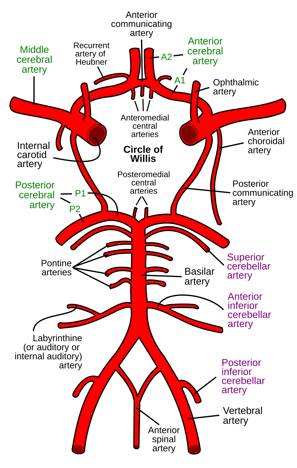Posterior Cerebral Artery Syndrome
Posterior Cerebral Artery Syndrome occurs when blood flow through the PCA is disrupted, usually due to a blockage or occlusion. The PCA supplies blood to crucial areas of the brain, including the occipital lobe, parts of the thalamus, and the midbrain. When this blood flow is compromised, it leads to a variety of neurological deficits.
NEUROLOGY
Rishwin A R
3/12/20252 min read


Causes of Posterior Cerebral Artery Syndrome
Several factors can result in PCA syndrome, and understanding these helps in timely diagnosis and management:
Ischemic Stroke: The most common cause. Often due to embolism or thrombosis.
Aneurysms: Bulging vessels can compress or rupture, disrupting blood flow.
Trauma: Head injuries that affect vascular structures.
Vasculitis: Inflammation of blood vessels, reducing perfusion.
Cardiac Sources: Emboli from atrial fibrillation or valvular heart disease.
Symptoms of Posterior Cerebral Artery Syndrome
The symptoms largely depend on the region of the brain affected. Here’s a breakdown of the most common clinical presentations:
Visual Disturbances
Contralateral Homonymous Hemianopia: Loss of the same side of the visual field in both eyes.
Cortical Blindness: Complete vision loss despite normal eye function.
Visual Agnosia: Difficulty recognizing objects.
Sensory and Motor Impairments
Thalamic Pain Syndrome (Dejerine-Roussy Syndrome): Chronic, debilitating pain on the opposite side of the body.
Hemiparesis or Hemiplegia: Weakness or paralysis on one side.
Ataxia: Impaired coordination, often due to midbrain involvement.
Cognitive and Behavioral Changes
Memory Impairment: Especially if the temporal lobe is affected.
Confusion or Hallucinations: Resulting from thalamic or temporal involvement.
Diagnosis of Posterior Cerebral Artery Syndrome
Accurate diagnosis is the first step in effective management. Here’s how it’s typically done:
Clinical Evaluation
Neurological Examination: Focused on vision, coordination, and sensation.
History Taking: Includes stroke risk factors like hypertension or atrial fibrillation.
Imaging Studies
MRI Brain with Diffusion-Weighted Imaging (DWI): Highly sensitive for acute infarcts.
CT Angiography: Helps visualize vascular occlusion or aneurysms.
Digital Subtraction Angiography (DSA): Gold standard for vascular imaging, though invasive.
Treatment of Posterior Cerebral Artery Syndrome
Early treatment can make a huge difference in outcomes. Management strategies typically include:
Acute Phase Treatment
Thrombolysis (tPA): If within the therapeutic window (usually 4.5 hours).
Mechanical Thrombectomy: For large vessel occlusions.
Secondary Prevention
Antiplatelets (Aspirin/Clopidogrel): To prevent future strokes.
Anticoagulation: In cases with cardiac embolic sources.
Risk Factor Control: Hypertension, diabetes, and hyperlipidemia management.
Rehabilitation
Vision Therapy: For patients with persistent visual deficits.
Physical and Occupational Therapy: To improve mobility and function.
Pain Management: Especially for thalamic pain syndrome.
Prognosis of Posterior Cerebral Artery Syndrome
Recovery varies widely:
Mild Deficits: Often recover well with minimal intervention.
Severe Cases: Persistent disabilities may occur, requiring long-term rehabilitation.
Visual Deficits: May partially recover, but cortical blindness is often permanent.
FAQs About Posterior Cerebral Artery Syndrome
1. Can PCA syndrome cause complete blindness?
Yes, if both PCAs are involved or if the occipital lobes suffer extensive damage, cortical blindness can occur.
2. Is PCA syndrome a type of stroke?
Yes, it’s a form of ischemic stroke affecting the posterior circulation.
3. What is the most common symptom of PCA syndrome?
Visual disturbances, particularly contralateral homonymous hemianopia, are the hallmark features.
4. How is PCA syndrome different from middle cerebral artery (MCA) syndrome?
PCA syndrome primarily affects vision and memory, while MCA syndrome usually causes motor and sensory deficits in the face, arm, and speech areas.
5. Is recovery from PCA syndrome possible?
Yes! Many patients recover well with early intervention and rehabilitation, although visual deficits can be permanent in some cases.
Syndromes.xyz
Explore medical syndromes and their details here.
For Educational purposes only
The information on this site is not in any way, replacement for professional advice. Always consult your physician regarding personal queries
Connect
Support
syndromesxyz@gmail.com
© 2024. All rights reserved.
